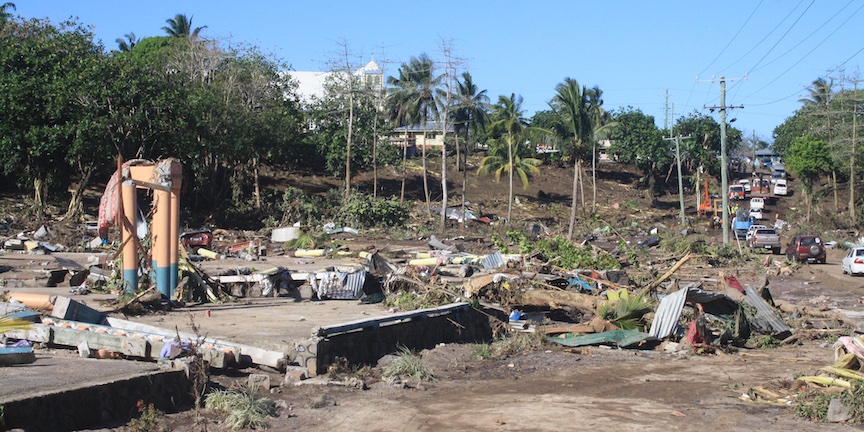FILE PHOTO : One of the many sites of the destruction the 2009 tsunami left behind at Aleipata, worst hit disaster area.
By Staff Writer
Samoa is the setting this week for a regional training on how to respond effectively to natural disasters in the Pacific and Asia regions.
A select group of 18 women leaders from 9 of the countries in the two regions are getting together in Apia tomorrow, Tuesday 7 March -11 March for the 5-day workshop training.
A study tour of the 2009 tsunami worst affected areas in Samoa is set to give participants first-hand experience of the damaging effects of natural disasters.
The study will cover the south-east of Upolu at Aleipata and Falealili where the tsunami did the most damage.
Visits with the Samoa National Emergency Centre, Samoa Red Cross and the United Nations will also be included.
The regional learning exercise is organised by the United Nations Institute For Training and Research, UNITAR, in a follow up to a similar training in Japan for World Tsunami Awareness Day.
This is the first time UNITAR Division for Prosperity will hold workshops in Samoa and is also the first time in two years that the disaster reduction programme will have in-person learning,” a UNITAR statement explained.
“The programme aims to equip women with practical skills and knowledge that help them lead gender-inclusive and community-based disaster risk reduction management.”
Participants for the Apia workshop were selected from the earlier training in Japan and are selected from Fiji, India, Kiribati, Micronesia, Papua New Guinea, Philippines, Samoa, Solomon Islands and Tonga.
“They will learn more about leadership and management in disaster risk reduction with topics that are focused on volcanoes, earthquakes, tsunamis, droughts, storms and flooding.
Media and communications in disaster risk reduction will also be included as well as gender and disaster risk reduction, people with disabilities and indigenous and traditional knowledge and nature-based solutions to disaster risk reduction.
Over the 5-day programme, participants will collaborate and build supportive networks
with each other and the resource persons. They will also develop disaster risk management plans based on their learnings, which they will present at the end.
The main objectives for the participants undertaking the second phase of the programme are
to:
– Describe important characteristics necessary for leadership and management concerning Disaster Risk Management and the DRR experience.
– Develop a technical understanding of risks associated with disasters that are more common in the region.
– Outline effective communication skills in DRR and a working professional understanding of working with the media.
– Discuss the needs of vulnerable groups for inclusivity in DRR planning.
– Develop a deeper understanding and appreciation for nature-based solutions, indigenous and traditional knowledge, and their relationship with local resilience.
On 11 March 2023, the anniversary of the 2011 Great East Japan Earthquake that devastated many parts of Japan, the participants will join Yappesu, a women-led non-profit organization in Ishinomaki, Miyagi, in a virtual activity between 1:30 – 3:00 pm and will observe a minute of silence at 2:46 p.m. (local time)– the moment the earthquake hit.
The organization is comprised of mothers who lead activities in learning and solving the issues that were encountered after the disaster in 2011.
Since 2016, UNITAR Division for Prosperity trains women professionals from small island developing states to help their countries and communities better prevent, prepare, confront and recover from disasters. The program has since expanded to include all genders. This programme is financially supported by the Government and the People of Japan.
